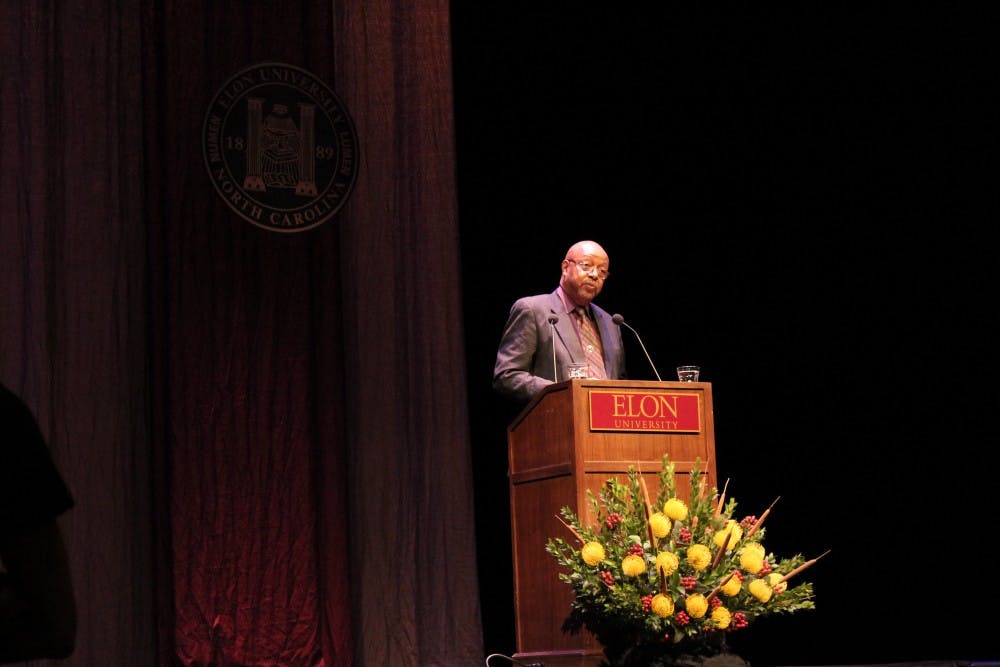Society is locked in a continual struggle with the crime of innocence, according to Pulitzer Prize winner and Miami Herald columnist Leonard Pitts Jr.
Pitts spoke on "Race in America," which he said is a "big, scary topic," Thursday night in Elon University's McCrary Theatre. His biggest issue is that the nation responds with an “accepted script” when confronted with incidents of racial bias.
He told story after story of these incidents, some personal, others that made national headlines, and how they conserve the blameless culture of innocence in the United States.
Pitts spoke of a time 41 years ago, when he walked out of a University of Southern California dormitory alongside a white man. Pitts was asked if he knew anything about a stolen bike. He was told he shouldn’t be upset for being singled out because of the school's location in a largely black area with a high crime rate.
“Innocence,” Pitts said.
Another story, 35 years ago, when he and his wife were stopped on the way home from a concert, and police, with guns at the ready, ordered them out of their car. The reasoning, the policeman told Pitts, was that his tail light was smoking.
“Innocence,” Pitts said.
And the time nine years ago when Martin Lee Anderson, a 14-year-old boy from Florida, died while incarcerated for stealing his grandmother’s car after guards manhandled him and forced him to inhale ammonia. One of Pitts' readers told him, "The guards did us a favor.”
“Innocence,” Pitts said.
Pitts spoke for 40 minutes, addressing this recurring theme of "innocence" regarding racial bias that he said has become engraved in U.S. culture.
This was perhaps best exemplified when Pitts said a reader of his referred to the Charleston shooting as, “A hoax perpetrated by liberals.”
“I mention that only to drive home how critical it is to some of us, and the desperate lengths they go to, to keep that thought, that innocence,” Pitts said. “If you can't claim innocence, what are you supposed to claim, guilt? People take that quite personally."
Pitts said racism is as prevalent as ever, and that he frequently hears from readers who are upset that he confronts the issue head-on.
The last seven years, he said, have been a “brutal awakening” for those who thought lasting racial progress was made when Barack Obama was elected president in 2008.
“It never is what it actually is," Pitts said about racial bias. "Always, it is something else, something other.”
But Pitts said there is action to take. A video he saw of white people marching through the streets chanting “Black Lives Matter” stood out to him.
"Maybe you cannot march," he said. "Maybe you have no money or celebrity to give. But you can see. And you can let it known that you see.”
Freshman Maya Eaglin, who introduced Pitts after writing an essay for her Global Connections class on race, religion and social issues, thought the speech did its part in encouraging discussion on the issues.
“He said a lot of things that needed to be said to people who maybe would not have heard that before,” Eaglin said. “I feel like it brings up conversations and conversations that wouldn’t have been already provoked. Maybe, I think it makes us engage in these conversations to create a more tolerant atmosphere.”
Freshman and member of Black Student Union Julian Rigsbysaid that he liked that Pitts' message can translate to Elon.
"I think Elon University has come a long way, of course, from what it was 20 years ago, but we still need to get on board and start making the community a better, safer, more aware place of cultural and racial diversities," Rigsby said. "And I think we’re doing a pretty good job now, but there’s still room for improvement."
Pitts’ theme of "innocence" resonated with freshman Kaitlin Welch, who said the speaker's remarks struck a chord she hadn’t previously considered.
“I thought it was very insightful and interesting to hear his point of view on the subject,” she said. “I especially enjoyed when he talked about America’s insistence on its own blamelessness, because I think he is right. Often times we try and push the problems onto someone else when really they are our problems, too.”
This story was jointly reported by The Pendulum and Elon Local News. Alex Hager and Sarah Wood contributed reporting.


